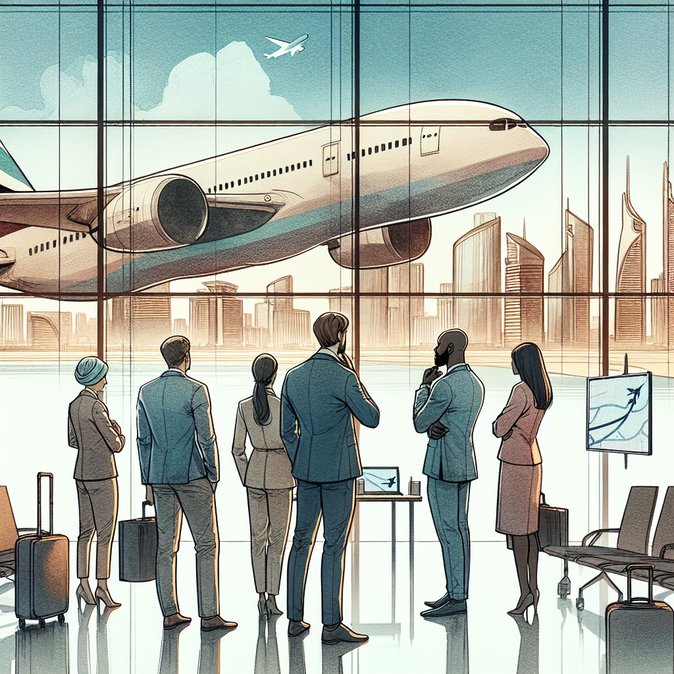
Etihad Airways quietly made corporate-travel history on 2 November 2025 when flight EY430 left Abu Dhabi International Airport’s new Terminal A at 09:05 and touched down in Hanoi just after 18:00 local time. It is the first non-stop link between the capitals of the United Arab Emirates and Vietnam, and the centre-piece of a broader four-route expansion that Etihad rolled out over three days (Tunis 1 Nov, Hanoi 2 Nov, Chiang Mai and Hong Kong 3 Nov).
For multinationals, the six-weekly Boeing 787 service cuts typical door-to-door journey times by six to eight hours compared with the previous one-stop options via Bangkok, Doha or Singapore. Cargo managers also gain a new wide-body belly-hold for electronics, fashion and perishable exports that move in both directions.
The route reflects deepening trade ties – bilateral commerce exceeded US $8 billion in 2024 – and plugs Vietnamese manufacturers directly into Abu Dhabi’s fast-growing free-zone ecosystem and onward links to Europe, Africa and North America. Conversely, it lowers the barrier for UAE investors exploring Vietnam’s renewable-energy, real-estate and tourism sectors.
![Etihad Launches First Direct Abu Dhabi–Hanoi Service, Opening New Bridge Between UAE and Vietnam]()
Business-travel buyers should note that Etihad has priced launch fares aggressively and aligned Hanoi with its ‘Corporate Value’ bundled-discount programme. Corporate mobility teams should also update travel policies: citizens of both countries can obtain 30-day e-visas on line, but Vietnamese travellers must still register for the UAE’s Advance Passenger Information system before departure.
Travel-risk managers will welcome that the service leaves Hanoi at 20:00, arriving in Abu Dhabi at 00:35, enabling same-night connections onto early-morning European bank-day flights without an extra hotel night. Companies relocating talent will find schooling and tenancy demand in Abu Dhabi’s Al Reem Island and Khalifa City districts already rising on the announcement.
Etihad says the four new gateways collectively add “thousands of new weekly seats”, accounting for almost half of the UAE’s net aviation growth this year. Provided load factors hold, the airline plans to up-gauge Hanoi to a daily service and explore Danang or Ho Chi Minh City as second Vietnamese points within two years.
For multinationals, the six-weekly Boeing 787 service cuts typical door-to-door journey times by six to eight hours compared with the previous one-stop options via Bangkok, Doha or Singapore. Cargo managers also gain a new wide-body belly-hold for electronics, fashion and perishable exports that move in both directions.
The route reflects deepening trade ties – bilateral commerce exceeded US $8 billion in 2024 – and plugs Vietnamese manufacturers directly into Abu Dhabi’s fast-growing free-zone ecosystem and onward links to Europe, Africa and North America. Conversely, it lowers the barrier for UAE investors exploring Vietnam’s renewable-energy, real-estate and tourism sectors.

Business-travel buyers should note that Etihad has priced launch fares aggressively and aligned Hanoi with its ‘Corporate Value’ bundled-discount programme. Corporate mobility teams should also update travel policies: citizens of both countries can obtain 30-day e-visas on line, but Vietnamese travellers must still register for the UAE’s Advance Passenger Information system before departure.
Travel-risk managers will welcome that the service leaves Hanoi at 20:00, arriving in Abu Dhabi at 00:35, enabling same-night connections onto early-morning European bank-day flights without an extra hotel night. Companies relocating talent will find schooling and tenancy demand in Abu Dhabi’s Al Reem Island and Khalifa City districts already rising on the announcement.
Etihad says the four new gateways collectively add “thousands of new weekly seats”, accounting for almost half of the UAE’s net aviation growth this year. Provided load factors hold, the airline plans to up-gauge Hanoi to a daily service and explore Danang or Ho Chi Minh City as second Vietnamese points within two years.






